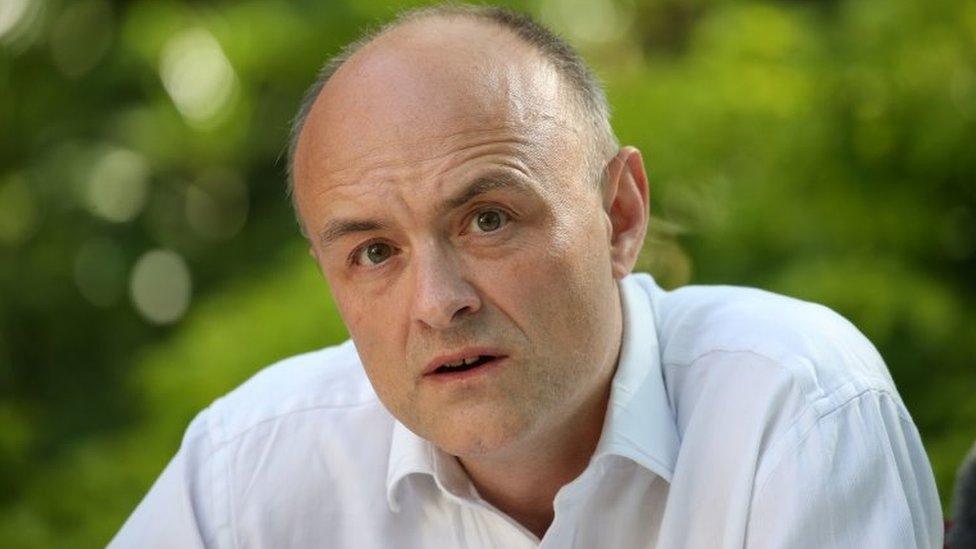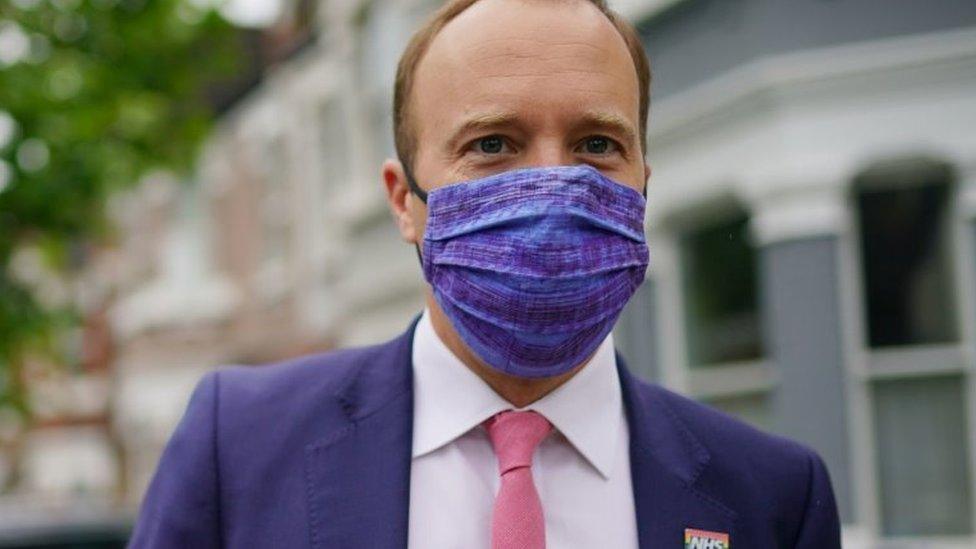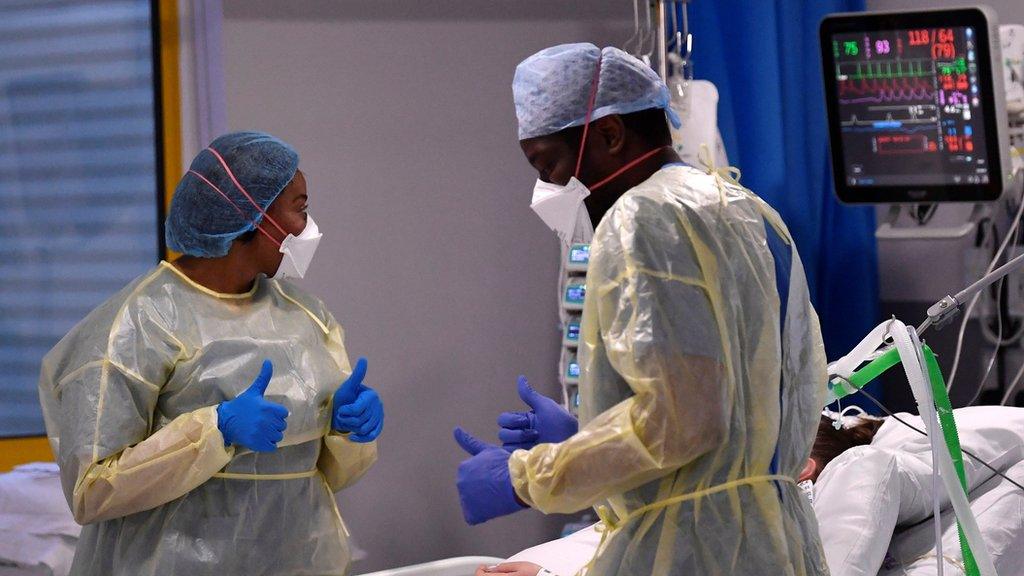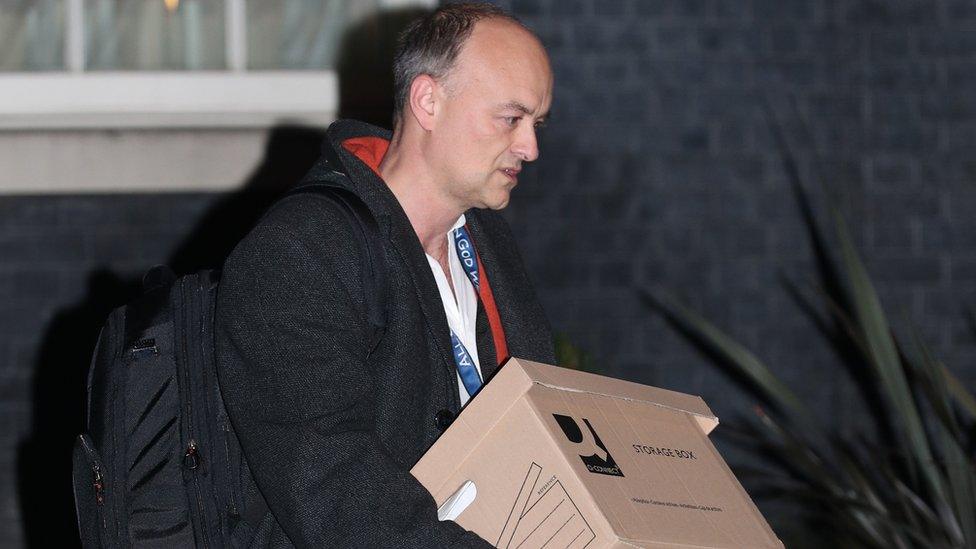Dominic Cummings tried to bypass rules over £530k grant, emails suggest
- Published

The PM's former top aide told staff to "immediately" issue a £530,000 grant with "no procurement"
Dominic Cummings tried to bypass the usual awarding process and fast-track a £530,000 government grant at the start of the pandemic, leaked emails suggest.
In an email, the PM's ex-top aide told civil servants to "immediately" issue the cash with "no procurement, no lawyers, no meetings, no delay".
Further emails show civil servants had concerns about the timeframe and whether it was in line with the rules.
The government said due diligence was followed in awarding the grant.
"We take these checks extremely seriously to ensure our contracts deliver results and value for money," the Department of Health and Social Care (DHSC) said.
The grant was eventually issued to the project Our World in Data, a research project run by a charitable organisation with academics at Oxford University, in four instalments from summer 2020.
In response, Mr Cummings wrote on Wednesday on his blog: "I sent that email because I wanted the problem solved instantly without distracting key people from other aspects of the emergency."
"I do not regard it as 'damaging' that I tried to throw 'due process' out the window - sticking with 'due process' was killing people," he said.
Mr Cummings left his role in Downing Street in November 2020.
A series of emails detailing discussions of the grant requested by Our World in Data were leaked to the BBC's File on 4, the Guardian, external and Source Material, external.
They begin with an email sent by the founder of the project, Max Roser, to William Warr, the prime minister's health adviser, who had requested details on the funding it needed.
The organisation said it had to retain key members of staff who were generating data on the pandemic. It also wanted to hire extra contractors and needed financial support for the rising costs of servers and technical infrastructure.
The request was passed to Health Secretary Matt Hancock and a minute after he received the email he emailed Matthew Gould, the CEO of NHSX - the unit tasked with the NHS' digital transformation - saying he supported the grant.
'No delay'
An email from Mr Cummings to Mr Gould followed a couple of hours later, saying: "Someone please ensure that they have the 530k within 24 hours from now and report back to me it's been sent.
"No procurement, no lawyers, no meetings, no delay please - just send immediately."
Further emails suggested this caused disquiet among the civil servants because of the request to pay out the grant money much faster than was normal.
The DHSC's internal guidance, seen by the BBC, says that directly awarding grants without any form of competition is discouraged. But ministers - such as Mr Hancock - have wide-ranging powers to do so.
The guidance is also clear that all grants should be subject to a series of timely checks and criteria. It says in some instances grants of more than £100,000 should be referred to an advice panel in the Cabinet Office.
These safeguards are in place to ensure value for money for taxpayers and to guard against corruption.

Health Secretary Matt Hancock gave his support to the grant
The following day, Mr Gould said his team could meet the request through the DHSC "and have the money in place by tomorrow", but it would mean "waiving the normal grant-giving process".
"I don't want to do anything untoward, but given the secretary of state's and Dom Cumming's strong steer I'd really welcome your help/advice/green light," he wrote to a colleague.
'Processes weren't followed'
A more junior civil servant responded saying the team needed to make the appropriate checks "to avoid leaving the accounting officer overly exposed".
Then, more than 24 hours later, the same civil servant suggested possible solutions, setting out the minimum criteria that needed to be met if the grant was to be paid.
But he wrote: "Matthew [Gould], I need your help please to progress this to a point where there is enough air cover to justify a decision to proceed."
Peter Smith, a former government commercial director and former senior adviser to the National Audit Office, said the "air cover" reference "means you're doing something that... is going to go down badly with the media or the public so you need to have some backup, some explanation".
The civil servant's final email said: "I'm sorry I couldn't just 'make this happen', but I share your concern about doing anything untoward."
In fact, the organisation that had been looking for the money then put the brakes on the application. Our World in Data asked for more time to understand the implications of accepting government money and to consult its trustees.
It went on to receive the grant in instalments and the project said it complied with its own procedures.
Max Roser, the founder and director of the project, told the BBC a full grant application was submitted on 25 March 2020 and this was followed by an agreement dated 30 April 2020.
"I have no way to know the internal processes inside the government," he said.
The project said its work had added value in the context of the Covid-19 pandemic, with its testing and vaccination data web pages receiving about 65 million visitors.

LOOK-UP TOOL: How many cases in your area?
LOCKDOWN RULES: What are they and when will they end?
FACE MASKS: When do I need to wear one?

A Whitehall source told the BBC they had been instructed not to share information about the grant discussion.
"In my view that's because it is so damaging to the NHSX: Dominic Cummings, Matt Hancock… everyone is just being very blatant that due process, and procedures, are being thrown out the window," the source said.
Speaking after being shown the leaked emails, Mr Smith said it was "quite clear that processes weren't followed", saying: "The attempt was to do it so quickly, clearly there was no time to do a proper due diligence."
He said senior people had put colleagues in the DHSC "into a very difficult position".
"So I think it was unethical, immoral, really, and yes, it was an abuse of power."
Jolyon Maugham QC, director of the Good Law Project, said: "The government guidance talks about extra safeguards for sums above £100,000. This was well above £100,000.
"There was no process that I can see before the decision was made to award this very substantial sum."
The DHSC said: "Officials carried out due diligence and followed appropriate processes before this grant was awarded.
"Every contract agreed by the government with partners has proper due diligence carried out on it."
Mr Warr has been contacted for comment.
Reporting by Anna Meisel, Paul Connolly and Emma Harrison

HEROIN, SAILORS, SPOOKS AND LIES: The thrilling story behind an international drug plot
TWAYNA MAYNE: Hilarious stand-up exploring gender and sexuality in a quest to understand her Black British identity

Related topics
- Published6 December 2022

- Published14 November 2020
